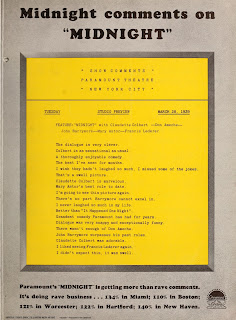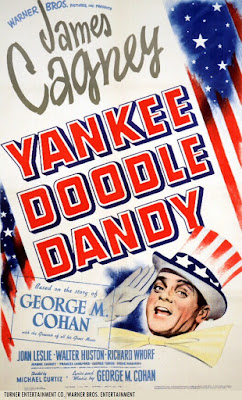It's almost Independence Day here at the "screening room" (and worldwide headquarters) of
At The Matinee. While the current lineup of "summer blockbusters*" mostly consisting of "endless" reboots and remakes, there's one definitive classic that outshines the competition. And it's perfect for the July 4th weekend.
That definitive classic film is 1942's
Yankee Doodle Dandy. Directed by Michael Curtiz and produced by Hal B. Wallis, the film features James Cagney (as George M. Cohan), Joan Leslie (as Mary Cohan), Walter Huston (as Jerry Cohan), Richard Whorf (as Sam Harris), Irene Manning (as Fay Tempelton), George Tobias (as Dietz), Rosemary DeCamp (as Nellie Cohan), Jeanne Cagney (as Josie Cohan), Frances Langford (as Nora Bayes), S.Z. "Cuddles" Sakall (as Schwab), and Eddie Foy, Jr. (as the senior Eddie Foy).
Based off the story of real-life songwriter George M. Cohan (1878-1942), the film goes into the life, times and career of the multi-talented entertainer and songwriter, who brought such popular classic songs including
Yankee Doodle Dandy, Over There, You're A Grand Old Flag, just to name a few.
When the film premiered in New York at the
Hollywood Theatre in May 1942, it was tremendous hit, and was one of the top-grossing motion pictures of 1942. According to
The New York Times, the audience on opening night purchased $5,750,000 worth of war bonds to help America's war effort during the Second World War.
For
Warner Bros. (who acquired the rights from Cohan for his life story, where Warners' competitors declined Cohan's story throughout the latter years of his life), it would be the studio's top-grossing film at the time (along with Warners' other popular noteworthy films released that same year, including
Casablanca,
Air Force, George Washington Slept Here, and
Now, Voyager).
The film won three
Academy Awards for Best Actor (James Cagney), Best Sound Recording (Nathan Levinson and the Warner Bros. sound department), and Best Music, Scoring of a Motion Picture (Ray Heindorf and and Heinz Romfeld).
My first experience of watching
Yankee Doodle Dandy was on
WETA's Saturday classic film showcase several years ago. I was originally going to plan to attend the recent revival screening of
Yankee Doodle Dandy at the
Majestic Theater in Gettysburg, Pennsylvania- but could not attend due to an important family commitment.
Warners has recently released
Yankee Doodle Dandy on
Blu-Ray (through the studio's "
Archive" line), from a new high-definition transfer (along with several extras ported over from the previous DVD release). It is also available for streaming on
Flixster and Warners'
YouTube VOD service. The film will be the highlight of
Turner Classic Movies' primetime lineup for the Fourth (at 8:00 PM EST).
I'm not going to give away any other additional information on this. To my fellow readers- if you haven't seen
Yankee Doodle Dandy, see it when you have the chance to. It is an entertaining and enlightening motion picture about the life and times of George Cohan, portrayed by James Cagney (in one of his few non-gangster roles on the screen).
I feel that in recent times, we need uplifting entertainment. And
Yankee Doodle Dandy is one of the best examples of uplifting screen entertainment. You won't be disappointed!
 |
1958 advertisement for Associated Artists Productions (AAP),
advertising the 1942 film Yankee Doodle Dandy, one of many pre-48
Warner Bros. feature films (along with shorts and select cartoons)
that were available for syndication to local television stations. |
FOURTH OF JULY OFFERINGS ON TV:
TCM will have a schedule of movies related to America's day of independence, beginning at 11:45 AM with the 1955 film,
The Scarlet Coat (featuring Cornel Wilde, Anne Francis, and George Sanders), followed by
The Devil's Disciple (1959, with Burt Lancaster, Kirk Douglas and Lawrence Oliver) at 1:30 PM, the musical
1776 (1972, featuring William Daniels, Howard Da Silva and Ken Howard) at 3:00 PM, the modern comedy
Miss Firecracker (1989, with Holly Hunter and Tim Robbins) at 6:00 PM, the 1943 Warner Bros. short subject on the
United States Army Band at 7:50 PM, and the big highlight of the night-
Yankee Doodle Dandy (1942) at 8:00 PM. It will be followed by
The Music Man (1962, featuring Preston Foster, Shirley Jones, Buddy Hackett and Ron Howard) at 10:15 PM, and
Rosalie (1937, with Nelson Eddy, Eleanor Powell and Frank Morgan) at 1:00 AM (eastern standard time).
As I've stated before, it wouldn't be the Fourth of July without the annual
Nathan's Famous Hot Dog Eating Contest in New York City, which will be telecast live on
ESPN2 at Noon EST.
Of course, there's always
A Capitol Fourth, live from Washington, D.C. on
PBS (from 8:00-9:30 PM EST).
Last but not least, it wouldn't be Saturday without
Svengoolie on
Me-TV, showcasing the third (and final) film in
Universal's Creature From The Black Lagoon franchise,
The Creature Walks Among Us (1956), which will be shown at 10:00 PM EST (for viewers from coast-to-coast, check local listings for time and channel).
WITH ALL THAT ASIDE: At The Matinee wishes everyone out there a happy (and safe) Fourth of July weekend. Do something great and exciting during this weekend!
NOTE: Again, I'm not criticizing the recent "summer blockbusters." I'm sure there are many (like myself) who would like more variety in the field of cinema entertainment.






